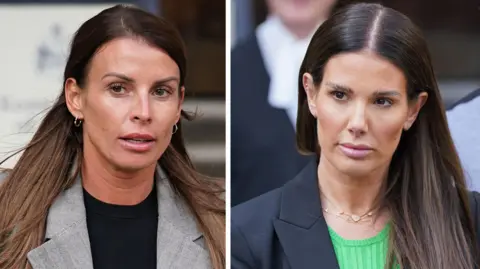Row over 'sheer magnitude' of Wagatha legal bill
 PA
PAThe so-called Wagatha Christie dispute has gone back to the High Court, with Rebekah Vardy challenging the "sheer magnitude" of the legal costs claimed by Coleen Rooney from their 2022 libel trial.
Mrs Vardy lost that case after a judge ruled it was "substantially true" that she had leaked Mrs Rooney's private information to the press.
The judge ordered her to pay 90% of Mrs Rooney's costs, which has reached more than £1.8m, including a stay at a luxury hotel, drinks and items from the mini-bar for one of her lawyers, Mrs Vardy's barrister said.
Mrs Rooney's barrister argued the costs could have been lower if Mrs Vardy had "conducted this litigation appropriately".
'Kitchen sink approach'
Jamie Carpenter KC, representing Mrs Vardy, said Mrs Rooney's total included costs for a lawyer staying "at the Nobu Hotel, incurring substantial dinner and drinks charges as well as mini bar charges".
In written submissions for Monday's hearing, he said: "The costs dispute has been rendered particularly intractable by the sheer magnitude of the costs claimed by Mrs Rooney, in absolute terms and when compared to her agreed costs budget, the number of errors in the bill and the extraordinary nature of some of the costs claimed."
Mr Carpenter added that the bill was "drawn without sufficient care", had "a 'kitchen sink' approach", and included "over £120,000 of costs to which Mrs Rooney has no entitlement".
Her legal bill was said in October 2022 to total £1,667,860, but has now risen to £1,833,907, the court was told.
Mr Carpenter added that the figure was three times over Mrs Rooney's agreed costs budget of £540,779, which he said was "a remarkable increase".
He also claimed Mrs Rooney had "deliberately misled" Mrs Vardy and the court with previous estimates of how much money and time she had spent on the case, which he claimed was "serious misconduct".
That should lead to a reduction in the amount of money Mrs Vardy has to pay, he argued.
'Deplorable conduct'
Robin Dunne, representing Mrs Rooney, said Mrs Vardy had chosen to launch the libel action "despite knowing that the Instagram post was true", and that she had shown "deplorable conduct" in the case.
He wrote: "Mrs Vardy refused to engage with Mrs Rooney to try and avoid these proceedings and by her conduct meant that significant additional costs were required to be incurred by Mrs Rooney."
Mrs Vardy rejected an offer to settle the case before it got to court, and an invitation to take part in mediation, he said.
Mr Dunne continued: "It sits ill in Mrs Vardy's mouth to now claim that Mrs Rooney's costs, a great deal of which were caused directly by her conduct, are unreasonable."
He added that "there has been no misconduct" on Mrs Rooney's side, and it was "illogical to say that we misled anyone".
Neither Mrs Rooney nor Mrs Vardy attended the hearing before Senior Costs Judge Andrew Gordon-Saker on Monday. It will conclude on Wednesday.
Detective work
Mrs Rooney, the wife of former England captain Wayne Rooney, was nicknamed Wagatha Christie in 2019 after saying she had conducted a sting operation to find out who had leaked stories about her from her private Instagram to the Sun newspaper. She concluded: "It's.... Rebekah Vardy's account."
That post led Mrs Vardy, the wife of Leicester City striker Jamie Vardy, to sue her for libel, and the trial attracted huge interest when it reached court two years ago.
Mrs Justice Steyn ruled that Mrs Rooney's accusation was "substantially true", saying it was likely Mrs Vardy "knew of, condoned and was actively engaged" in the process of leaking stories about Mrs Rooney to the Sun in collaboration with Mrs Vardy's agent, Caroline Watt.
Mrs Rooney branded the trial "horrible" in an interview with British Vogue last year.
She suggested she could not forgive Mrs Vardy for her libel claim, but said "the relief was everything" to win.
Mrs Vardy went on to trademark the phrase "Wagatha Christie" after losing.
